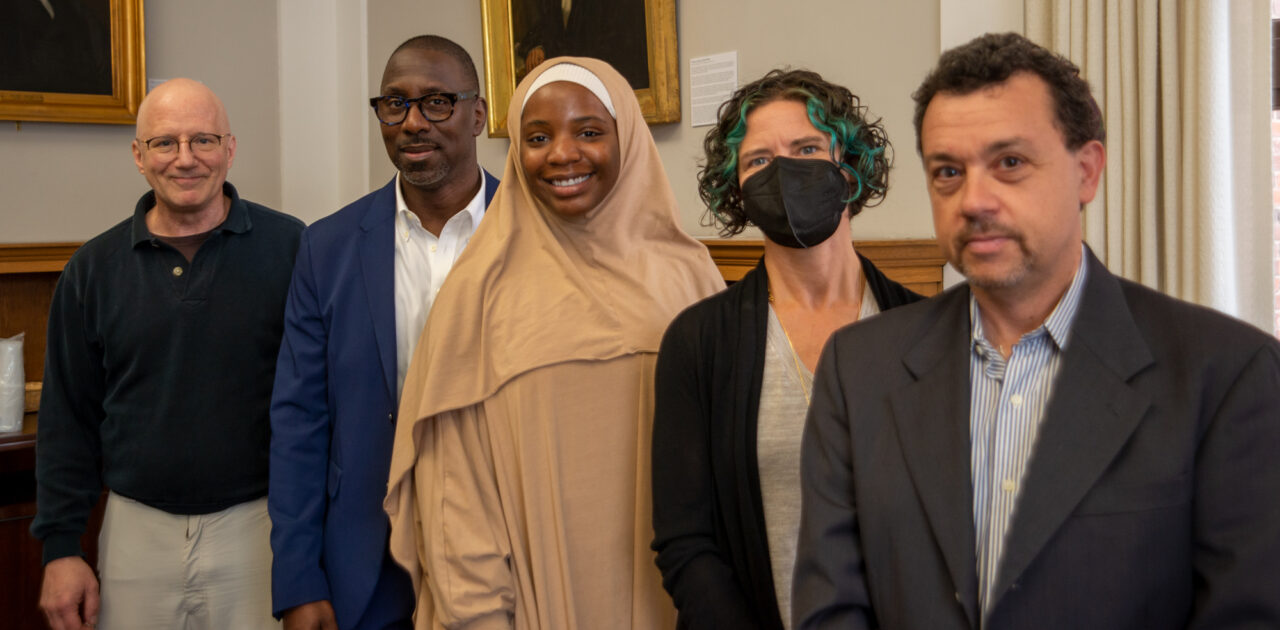How Do You Love Yourself and Others?

What might a life anchored in integrity, community, and meaning look like?
A small group of faculty, students, and staff, fortified by Thai food and a welcoming atmosphere, got together in the Develin Room in Olin Library October 15 to kick around these ideas.
The talk, entitled “In a World Full of Fear, How Do You Love Yourself and Others?” brought together thinkers from across campus for a conversation. Exploration was the goal of the day. Mary-Jane Rubenstein, professor of religion; Rev. Marichal Monts ‘85, pastor of The Citadel of Love in Hartford; Dia Fortenberry, the Diversity, Equity, Inclusion, Engagements and Initiatives NCAA Intern; and William Johnston, the John E. Andrus Professor of History, offered their thoughts on love, fear, grounding, and faith.
“The University is a place that needs to be asking both timeless and timely questions. Many students are interested in knowing more about their faculty mentors and how they make sense of the world. Many of the student questions at the panel were focused on how to best be civically engaged and holistically alive in the world,” said Rabbi David Leipziger Teva, director of religious and spiritual life and the event organizer.
There weren’t any specific answers. There was no certainty displayed, no sense that there was a single path forward toward enlightenment, happiness, or even knowing what to do on a daily basis. However, there were people earnestly sharing their own beliefs about what helped them live lives of impact and value.
Political and social unrest in the United States and across the world, coupled with the long shadow of the global pandemic have prompted people to reconsider their lives.
“It is a moment of increased anxiety. It is a moment of, perhaps, alienation, and that has left us feeling either cynical or fearful, or perhaps both. But it is also a time, post-pandemic, when many of us are asking how we might get reset, how we might live with greater purpose, with more resolve and with less fear,” Teva said.
The speakers talked about loving themselves and others, and finding peace in the rituals of their lives. Some of the recommendations were rooted in specific faith traditions. Others were rooted in the ideas of health and wellness, like exercise, proper nutrition, and therapy.
All of the speakers called for empathy and understanding.
“I love people by valuing their time, validating their perspectives, respecting their paradigms, and always being open to learning from who it is I’m engaged with,” Fortenberry said. “I love myself by being gentle with myself.”
For Monts, loving others results in action. His church in Hartford has devoted itself to feeding the surrounding community. A few weeks ago, his church partnered with other organizations to deliver 15,000-lbs. of food to the community. “That is certainly one of the ways that we try to love people,” he said.
By taking concrete action, he was able to move the congregation’s conversation from proving how religious a person was to acting with purpose. “Over the past 27 years (in ministry) I have spent a lot of my time trying to teach people how to love themselves as they are,” he said.
Rubenstein grew up in a variety of faith traditions and rather than espousing a single one, she tends to immerse herself in many modes of spirituality. “This is not from a lack of religious identification, but a surfeit of it. I grew up with so much different stuff and have built for myself a world where I draw from as much of it as I can,” she said. “I’ve made an effort to love and affirm whenever possible.”
During interpersonal difficulties, Rubenstein will often try to remember that to someone else in the world, the person with whom she is having a conflict is “everything.” “I have planted in me a sort of rabbinical sensibility where I try to see everything that comes at me from as many different perspectives as possible,” she said.
Johnston who, in addition to being a professor is a Soto Zen Buddhist monk, sought from his youth in Wyoming ways to quiet his mind and find answers about being and existence. Quiet meditation helped him focus on what he can control about his daily life – he didn’t have to be angry or hard on himself; he could replace that feeling with love.
“I found in sitting a way of opening up and letting go. It was this letting go of the self-expectations, letting go of the narratives that I would be carrying around in my head,” Johnston said. “It would be part of me as my identity and I realized that I don’t have to carry this narrative around.”
After the panelists spoke, Teva opened the floor to questions and thoughts. “This resonated so much with me, much more than I thought it was going to,” said the first student who addressed the panel.
She talked about all the options available to her and how by doing one thing she could be negatively impacting someone else – there were just so many routes she could take in her day-to-day affairs. There were just so many problems in the world and she had a desire to fix them.
“So, what do I do?” she said.
The talk was sponsored by Wesleyan’s Office of Religious and Spiritual Life; WesWell; the Office of Health Education; the Interfaith Council; and Mindful Wes.\

